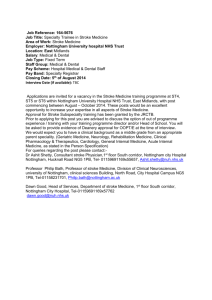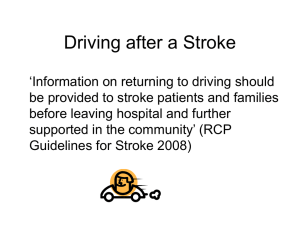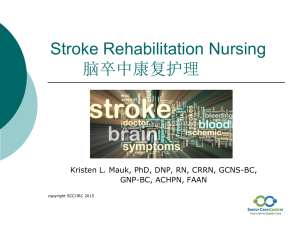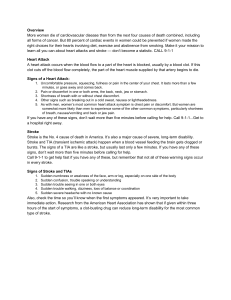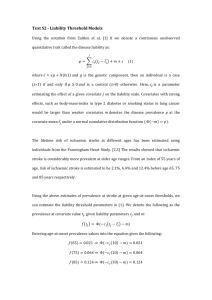A brief outline of consumer involvement in the research
advertisement
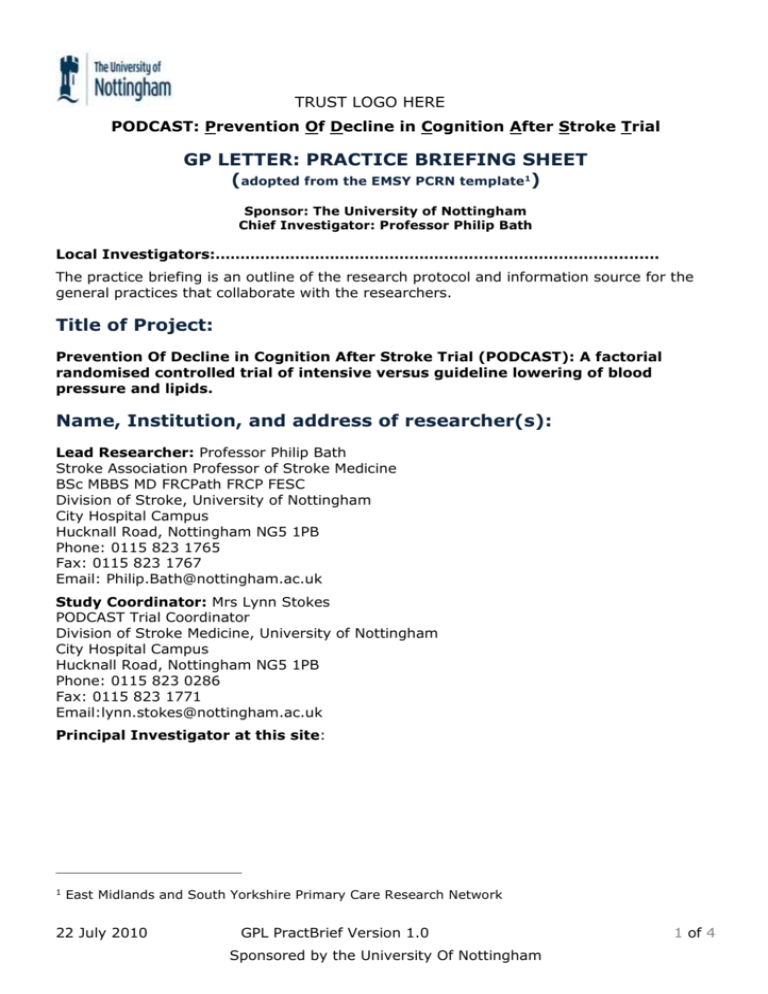
TRUST LOGO HERE PODCAST: Prevention Of Decline in Cognition After Stroke Trial GP LETTER: PRACTICE BRIEFING SHEET (adopted from the EMSY PCRN template1) Sponsor: The University of Nottingham Chief Investigator: Professor Philip Bath Local Investigators:……………………………………………………………………........... The practice briefing is an outline of the research protocol and information source for the general practices that collaborate with the researchers. Title of Project: Prevention Of Decline in Cognition After Stroke Trial (PODCAST): A factorial randomised controlled trial of intensive versus guideline lowering of blood pressure and lipids. Name, Institution, and address of researcher(s): Lead Researcher: Professor Philip Bath Stroke Association Professor of Stroke Medicine BSc MBBS MD FRCPath FRCP FESC Division of Stroke, University of Nottingham City Hospital Campus Hucknall Road, Nottingham NG5 1PB Phone: 0115 823 1765 Fax: 0115 823 1767 Email: Philip.Bath@nottingham.ac.uk Study Coordinator: Mrs Lynn Stokes PODCAST Trial Coordinator Division of Stroke Medicine, University of Nottingham City Hospital Campus Hucknall Road, Nottingham NG5 1PB Phone: 0115 823 0286 Fax: 0115 823 1771 Email:lynn.stokes@nottingham.ac.uk Principal Investigator at this site: 1 East Midlands and South Yorkshire Primary Care Research Network 22 July 2010 GPL PractBrief Version 1.0 Sponsored by the University Of Nottingham 1 of 4 TRUST LOGO HERE Proposed starting and finishing dates: Start Date: 1 September 2010 End Date: 31 August 2018 Funding body and amount: Source of Funding: 50:50 Co-funded by The Stroke Association UK and Alzheimer’s Society UK Amount of Funding: £ 399,145 Idea behind the project and outline of study design: Background Approximately 30% of people who have a stroke, go on to develop cognitive problems, and then dementia. Both stroke and dementia are devastating, causing people to lose their independence, so that they need care from family or in an institution. Both conditions are very expensive to society through lost work, healthcare and family-care costs, and being in an institution. There are no licensed treatments for these people and little investment in research. Although several blood pressure lowering studies have assessed cognition, the results are not conclusive, as cognition was only ever a secondary outcome. Nevertheless, it appears that lowering blood pressure may delay or reduce cognitive decline. Lowering cholesterol could reduce cognitive decline, in part by preventing stroke, but the evidence to date is limited. A large, well designed study is urgently needed to test whether intensive treatment of high blood pressure and high cholesterol can reduce the number of people developing a decline in cognition, and dementia after stroke. If the trial is positive, the interventions are readily available and can be introduced into the NHS rapidly and inexpensively so that the risk of cognitive impairment and dementia can be reduced by 20% or more in stroke survivors. Project Aims Primary: To determine if ‘intensive’ blood pressure lowering therapy, and/or ‘intensive’ lipid lowering therapy, reduces cognitive decline and dementia after stroke. Secondary: To determine if ‘intensive’ blood pressure lowering therapy, and/or ‘intensive’ lipid lowering therapy, reduces poor quality of life, poor function, depression, stroke recurrence, vascular events, and death, after stroke. Overview of the trial The trial will run in two phases. The start-up feasibility phase will aim to recruit 600 patients across the UK in the first 3 years, and the main phase, a further 2,800 participants from across 100 sites internationally over the next 5 years (total 8 years). Participants with confirmed ischaemic or haemorrhagic stroke, 3-7 months post event, who satisfy the inclusion and exclusion criteria will be randomised to the ‘intensive’ or ‘guideline’ BP management group by the hospital researchers. Participants with an ischaemic stroke 22 July 2010 GPL PractBrief Version 1.0 Sponsored by the University Of Nottingham 2 of 4 TRUST LOGO HERE (but not haemorrhagic) will also be randomised to the ‘intensive’ versus ‘guideline’ lipidlowering arm. The ‘intensive’ BP lowering group will aim for a SBP <125 mmHg, and the ‘guideline’ group a SBP<140 mmHg. The ‘intensive’ lipid-lowering group will aim for a target LDL cholesterol <2.0 mmol/l, and the ‘guideline’ group a target LDL-cholesterol of <3.0 mmol/l. The number of drugs and/or doses in the ‘intensive’ group will be escalated on review at the hospital research centre; the guideline groups will be managed by their GP, as per current guideline recommendations. Cognition and other outcome data will be collected at baseline and six monthly follow-ups (alternating research clinic and research telephone follow-up) for upto 8 years. An interim analysis will be performed at the end of the start-up phase (3 years) to assess feasibility. Study participants will be recruited from the local hospital, consented in the hospital’s research clinic, and be randomised to: Intensive or guideline BP lowering (all participants) Intensive or guideline lipid lowering (ischaemic stroke only) As a result, patients can be randomised to one of 6 groups: Intensive Intensive Guideline Guideline Intensive Guideline BP BP BP BP BP BP lowering lowering lowering lowering lowering lowering and intensive lipid lowering (ischaemic and guideline lipid lowering (ischaemic and intensive lipid lowering (ischaemic and guideline lipid lowering (ischaemic (intracerebral haemorrhage only) (intracerebral haemorrhage only) stroke stroke stroke stroke only) only) only) only) A brief outline of consumer involvement in the research project: The trial is supported by the: Alzheimer’s Society Quality Research in Dementia Consumer Advisory Network Stroke Research Network Prevention Clinical Studies Group Trent Stroke Consumer Group. Three members of the Patient, Carer and Public Involvement Group; Mr John Murray, Mr Dave Hanbury and Mr Andrew Pepper, have specifically reviewed and advised on the content of the revised versions of the information sheets. Exactly what is expected of the practices? Recruitment and consent will not involve GPs. All trial case report forms will be completed at the recruiting hospital (for clinic data) or by the Coordinating Centre (for telephone data). No data forms will need to be completed by GPs. Blood Tests GP practices will be asked to perform blood tests for U&E and lipids. The request for these tests will come from the local hospital research centre and GP practices are not expected to chase patients for these blood tests. Blood tests performed will depend on the group the patient is randomised to. 22 July 2010 GPL PractBrief Version 1.0 Sponsored by the University Of Nottingham 3 of 4 TRUST LOGO HERE For patients in the intensive BP group, blood tests for U&Es should be performed 1-2 weeks prior to the hospital visit at 1, 2, 3, 6, 18, 30 months etc. For patients in the guideline BP group blood tests for U&Es should be performed 1-2 weeks prior to the hospital visit at 6, 18, 30,42 months etc For patients in the intensive lipid group, blood tests for fasting lipids (TC, TG, HDL) should be performed 1-2 weeks prior to the hospital visit at 3, 6, 18, 30 months etc For patients in the guideline lipid group, blood tests for fasting lipids (TC, TG, HDL) should be performed 1-2 weeks prior to the hospital visit at 6, 18, 30 months etc. Management and Prescriptions For intensive BP and lipids groups, prescriptions should be continued as suggested by the local hospital research team, unless there is a significant clinical reason to change therapy. Please let the hospital research team know if therapy is changed. For guideline BP and lipids groups, GPs will treat trial participants as is their usual practice, based on current guidelines. The implications for the practice’s patients Intensive treatment of BP and lipids after stroke may prevent cognitive decline and recurrent stroke after stroke although no promises will be made. What the practice will be offered (feedback, finance etc.) Relevant information on participants regarding BP, lipids, other vascular prophylaxis, life style advice etc. will be fed back to the GPs. Such information may be useful for patient records and returns for Quality and Outcomes Framework indicators. The funding for performing blood tests will come from the service support costs from the PCRN. Practices will be reimbursed at a rate of £70 for a lipid test and £55 for a U&E test. If both tests are done at the same time, practices will be reimbursed at a rate of £80 for the combined U&E and lipids blood test. The excess treatment costs for participants in the PODCAST study has been approved by your Primary Care Trust. Other information GPs should continue to conduct other necessary checks / blood tests for study participants, as per their usual practice and based on current guidelines. For example, this might include performing lying/standing BP measurements in patients with falls, blood creatine kinase (CK) for patients complaining of muscle pain and tenderness (as a potential adverse event associated with statins). If your practice uses the Script Switch software, please remember to ignore its advice when prescribing for patients in the trial. 22 July 2010 GPL PractBrief Version 1.0 Sponsored by the University Of Nottingham 4 of 4
